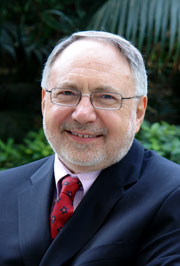Bringing a message of hope to persecuted Christians through satellite TV

For the past 40 years, satellite television has been broadcast across the world, reaching previously isolated countries and regions with vital news and information.
At the forefront of Christian broadcasting is SAT-7, a ministry that uses satellite TV to reach millions of people with the Gospel of Jesus across the Middle East and North Africa.
Satellite TV is able to bypass local government censorship, and the core hope of SAT-7 is to present the Gospel and make it available to all people, and to support and encourage the Church in places of persecution especially.
Last week, Dr Terence Ascott, CEO and founder of SAT-7, spoke at the 2013 conference of the Fellowship of European Broadcasters (FEB). The theme of the conference was 'Changing Media - Unchanging Message.'
Christian Today spoke with Dr Ascott to hear what he had to say on the issue.
He said SAT-7 had seen "phenomenal growth" in the number of people they have been able to reach in recent years.
"When Sadam Hussein fell, the first thing many people did was go out and buy a satellite dish," says Dr Ascott. "We saw the same thing in Afghanistan with the collapse of the Taliban. People started watching satellite television, and bringing TVs out that that they had previously hidden away."
In recent years, however, they have seen a shift in the way that people access information with the rise of social media. SAT-7 has professed a commitment to stay at the forefront of media developments, which is proving vital in serving audiences who are themselves experiencing unprecedented change in their lives and societies.
"With a changing platform comes a change in the way that people view, and what they will view," notes Dr Ascott.
"People now tend to watch high quality, short, high impact pieces rather than longer programmes."
SAT-7 has responded to this shift by broadcasting shorter, more provocative pieces to supplement linear broadcast satellite TV.
Most recently, it has also seen rapid expansion through new media channels such as online webcasting, YouTube channels, and applications that enable viewing on mobile phones. Over 600,000 clips and programmes are downloaded from its Arabic language YouTube page alone every month.
This has been a slow process in the Middle East, however, as poor broadband internet quality, censorship, and low literacy rates has limited the number of people who are able to access SAT-7's media channels.
Despite this, Ascott is still pleased with their growth and the fact that 30 per cent of the Arabic world now has some access to the internet, which makes SAT-7's ministry increasingly important.
"While television is a useful and entertaining media in the West, it can actually be an agent for changing lives and political regimes in the Middle East. And newer social media can help mobilise millions," says Dr Ascott.
"There is a missing hope in the Middle East. The Christian Church has been almost completely decimated. Thousands of Christians have been internally displaced, or made refugees in other countries.
"But the Gospel has shone through in all this. We want to share the hope of the Gospel, to bring hope into a situation which is otherwise hopeless."











